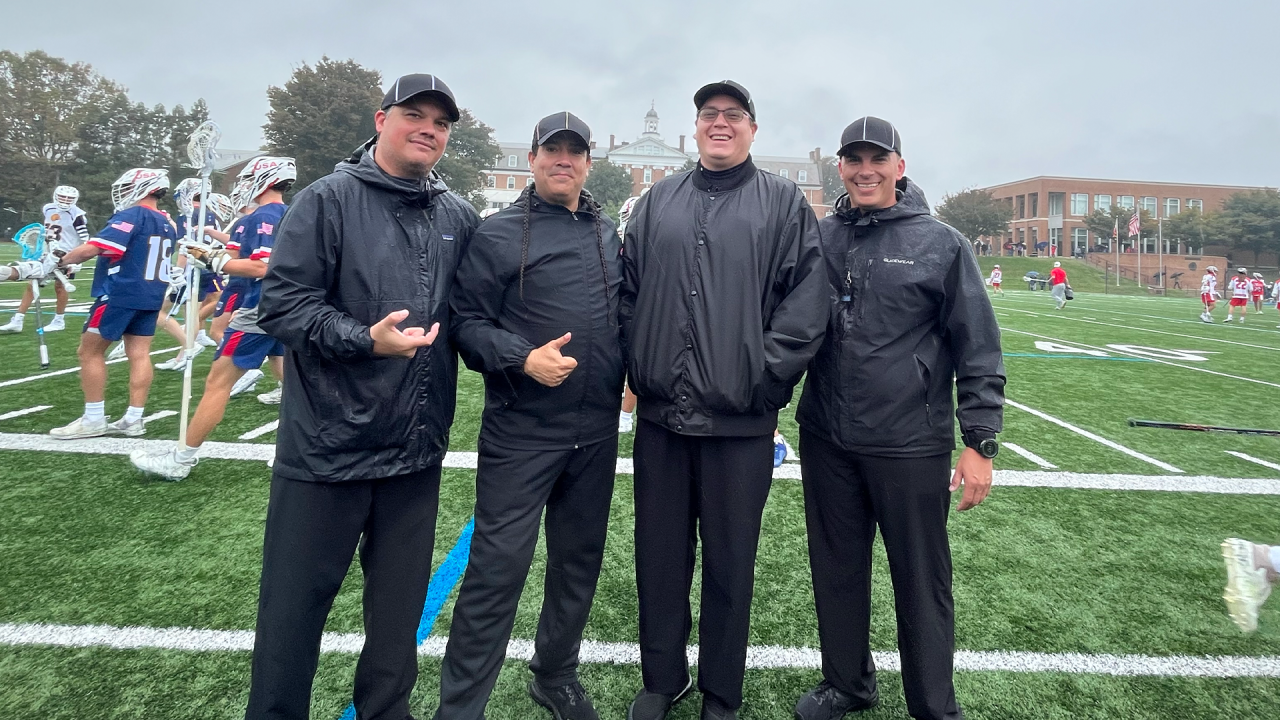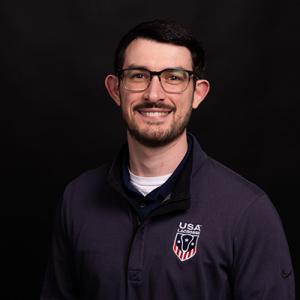
How These Native American Lacrosse Officials Stay Connected to the Creator's Game
Bob Ross might call it a “happy little accident.” At the time, John Szabo, Justin Giles, Trent Bray and Jeff George wouldn’t have called it anything other than another game. Looking back, it’s became a source of honor and pride.
In October 2023 at USA Lacrosse headquarters in Sparks, Md., during the Brogden Cup, the four-man crew made what they believe to be history as the first all-Native officiating team – at least at a USA Lacrosse event, but quite possibly at the NCAA and professional levels, too.
“We didn’t even think of it as anything historic,” Giles said this week. “But after the first game, someone pointed out it was an all-Native crew. We were like, ‘Holy crap.’ It wasn’t mean to create history. It just kind of happened.”
Originated in 1988 to honor former Johns Hopkins goalie Mac Brogden, who represented the United States in the 1932 Los Angeles Olympics, the historic Brogden Cup originally pitted post-collegiate club players from the United States against Canadian players.
Since 2019, Team Ontario, USA Lacrosse and the Haudenosaunee have competed for the Brogden Cup to grow international competition for some of the best youth lacrosse players in the world.
“I knew who I was officiating were people we’re going to see in the Olympics and in the pros,” Giles said. “When I see players out there and I know it’s a high level, I want their careers to be long so I can live vicariously through them a little bit.”
It was Szabo who worked to assemble the crew. The director of officiating for the First Nations Lacrosse Association, Szabo was invited to the event by Team Haudenosaunee and was tasked with recruiting others. He leaned on those he knew best, with no intent outside of providing the best officials for the talent-rich event.
Before being interviewed for this story, Szabo took time to reflect on what became a historic moment.
“When I think about it now, it fills me with joy,” he said. “It fills me with pride, to be perfectly honest. I played lacrosse my whole life. I’m 48 years old and have been playing since I was 5. When I was unable to play anymore, I got into officiating just to be part of lacrosse and to give back to the game. I don’t want to be without it.”
Both Giles and Szabo couldn’t resist the pull of the stripes once they were recruited into the brotherhood of officials.
Ever since a knee injury slowed his playing career, Giles was drawn to the game in another way. It was former Virginia coach Dom Starsia who presented officiating as a “positive, benevolent” alternative. And as a former attackman, Giles loved being in the mix. Being an official came him that same feel.
“This gives me a whole different perspective and a view of the game that I understood, but you don’t really understand until you put on the stripes and grab the whistle and flag,” he said.
The biggest adjustment for Giles was being on the field without his stick. He does still carry it everywhere and leaves it on the sideline while he works.
But officiating became a new way to give back to the game with deep Native roots. And it also presented a new challenge.
“Thankfully, your brain as a referee is so immersed in the game, it’s almost like you’re playing,” he said. “At least that’s been my experience.
“Refereeing, you talk about being a student of the game. You have to study a rule book. And then you get quiz. Lacrosse is a classroom without walls, but refereeing, you have to go to a classroom and get certified every year.”
Szabo grew up with a wooden stick gifted to him by his grandfather. He still has it. It felt different to be on the field without that stick — or any stick — in his hands. He doesn’t think so much about it now as he nears two full decades as an official.
“Lacrosse is played for our Creator and for his enjoyment,” Szabo said. “You play lacrosse for those who can’t. It’s a source of honor and a way to honor them. Me still being allowed to be part of the game, even not as a player, is impactful for me.”
That’s the sales pitch he brings when trying to recruit new officials to the ranks. Even after your playing days are over, putting on the stripes let you feel the thrill of lacrosse from a different perspective — and get paid for it.
“I’ve always been under the mantra that I think ex-players make some of the best referees,” Szabo said. “They may not even ever consider being an official, but sometimes you can find that gem who wants to not only make some extra money but has a love for the sport and possesses the right skill set — level-headed, being familiar with how the game should be played.”
It keeps you close to the game and could lead to highlight moments, like officiating international competition and being part of likely the first all-Native crew.
“I have two long braids and I wear my USA flag and my Haudenosaunee flag [on my referee uniform],” Giles said. “That’s me representing but having some PR and sharing the roots and the culture.”
Kenny DeJohn
Kenny DeJohn has been the Digital Content Editor at USA Lacrosse since 2019. First introduced to lacrosse in 2016 as a Newsday Sports reporter on Long Island (yes, ON Long Island), DeJohn specializes in women's game coverage. His search for New York quality pizza in Baltimore is ongoing.

Categories
Tags
Related Articles




